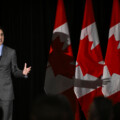Like many other countries, Canada is anxiously awaiting developments out of Washington today on the tariff front.
On what President Donald Trump has dubbed “Liberation Day” for America, Canada could be among dozens of countries hit with a fresh round of U.S. tariffs—so-called reciprocal tariffs—aimed at what the administration claims are unfair trading practices.
On Monday, the U.S. administration released a report detailing trade barriers faced by American exporters. Several of Canada’s policies were flagged, including restrictive supply management rules that limit market access for U.S. dairy, intellectual property concerns, telecom and broadcasting restrictions, and digital taxes targeting U.S. tech firms.
The report also cited issues with Quebec’s controversial Law 96, which, among other things, requires French translations for product labeling.
Trump plans to announce the tariffs today at an event at 4 p.m. ET in the White House Rose Garden. The U.S. administration has said the tariffs will come into effect immediately, though there may be scope for countries to negotiate lower duties, according to the White House.
Any new tariffs will almost certainly escalate the trade war with Canada and compel all political parties to more explicitly chart a position on retaliation.
In fact, the political incentives for all parties may point toward responding aggressively in the lead-up to election day on April 28.“We will respond to additional measures,” Prime Minister Mark Carney said at a press conference yesterday. “We will put in place retaliatory measures if there are additional measures put against Canada.”Separately, Conservative leader Pierre Poilievre took particular offence to the reference to Quebec’s language law in the U.S. trade report.“The United States has no right to dictate our linguistic laws—or ANY of our laws. We are a proud, sovereign country,” Poilievre said on the social media platform X.
One big question is how much we should take the retaliatory threats at face value. Which Canadian actions are credible enough to influence Trump’s strategy—and which are not?
Eurasia Group’s Ian Bremmer touched on these credibility issues in a controversial analysis last week on how Trump’s trade moves are affecting U.S. allies.
While relations with the European Union are “fundamentally damaged,” Bremmer argued that Canada and Mexico are more likely to bend.
“They have no credible strategy to push back. Everyone understands they’ll have to accept Trump’s terms eventually; the only question is whether capitulation comes before or after a costly fight.”
Canada already has retaliatory tariffs on roughly $60 billion worth of U.S. goods. The Liberals have pledged to expand that figure to $155 billion if existing tariffs remain in place. Should the government impose countermeasures at that scale, it could generate anywhere from $15 to $30 billion in new annual revenue—possibly more.
Prime Minister Mark Carney has sent mixed signals on how costly a fight he’s prepared to wage. Two weeks ago, he said it would be unviable to go toe-to-toe with Trump on tariffs. But on Thursday, after the White House announced new auto duties, Carney came out swinging with a defiant speech:
“The old relationship we had with the U.S.—based on deepening integration of our economies and tight security and military co-operation—is over.”
Any reciprocal tariffs could come on top of the 25 percent tariffs on car imports to the U.S., set to take effect April 3, and the 25 percent tariffs on steel and aluminum that came into force last month.
Canada is also awaiting final decisions on existing U.S. tariffs—a 25 percent duty on most goods (10 percent on energy) imposed March 4 but deferred for one month.









